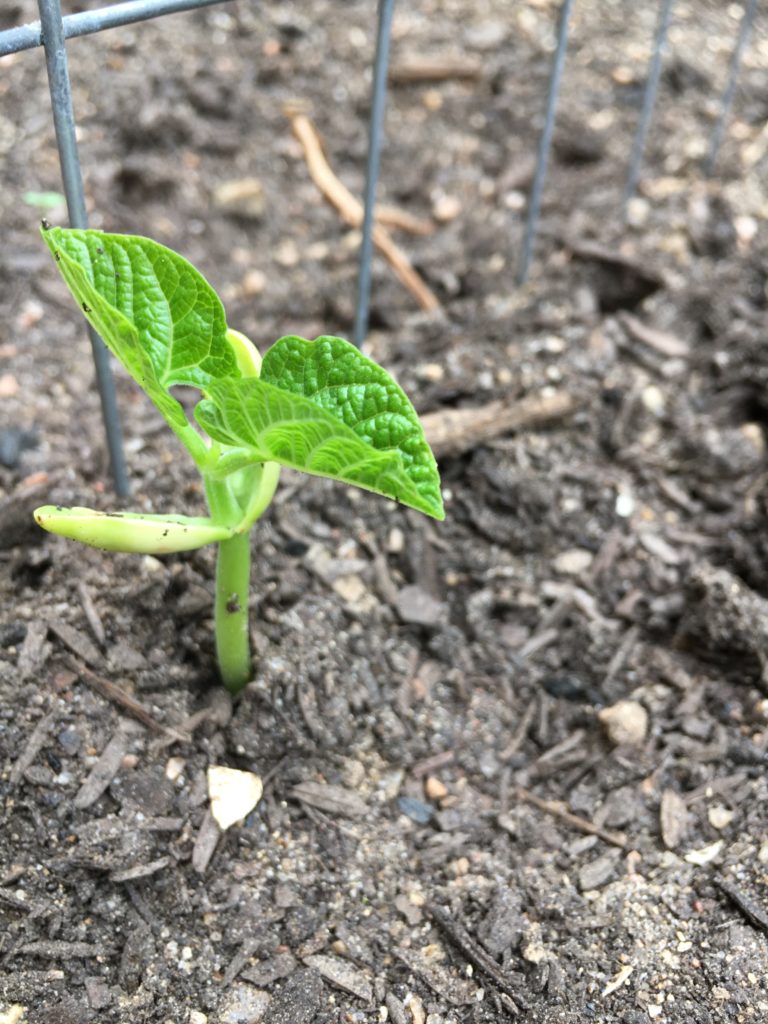
My original task for this blog post was to tell you all about the vegetable and herb garden several members of our community have worked to rebuild and plant for spring at the seminary. When I sat down to write, however, news of the pandemic was falling all around me, and talk of ordinary things like tomatoes, peppers, and marigolds didn’t seem quite right.
And yet, through the last couple weeks of difficult news, the garden has been a little place of hope and encouragement for me. A couple of weeks ago, before we had indication of COVID-19 in Austin but the news from China, Italy, and other parts of the world was tragic, I was walking with a heavy heart and happened to stop by the garden. The sight of a little bean sprout that had emerged from its case and begun to unfurl its leaves brought a sudden shot of normalcy and hope to me.
Despite all that was going on that weighed on me and the whole human community, the beans we planted the first weekend in March were carrying on with their task—putting down roots and lifting up their fresh leaves to the sunshine.
As I’ve been out for daily walks with my dog (which, as of this writing, can continue despite our current shelter in place order), I notice this same pattern all over the natural world. Wildflowers like bluebonnets and poppies burst forth with color and beauty while the news continues to get harder to read. The dissonance between beauty and tragedy has been jarring, and yet the plants have also been comforting.
An excerpt from an On Being interview with poet and philosopher David Whyte gave me some insight into this feeling.* He says, “One of the healing things about the natural world to human beings is that it’s just itself.” A hawk is only ever a hawk, he says, and can’t pretend to be anything else. Animals and plants do not pretend to be anything other than themselves, and they carry on just as they are.
So it has been a great comfort in this uncertain time to see the bean shoots behaving as bean shoots do, slowly winding their way up the trellis. Watching from my window as the trees put out new, bright green leaves and the flowers bloom has been a way of keeping time in this strange season when schedules (and so much more) are disrupted and the future is full of unknown.
And here’s what I observe in the steadiness of the natural world: the stems and leaves of bluebonnets turn pale when the hot sun hits them for several days in a row. The wildflowers bounce back after a steady rain. The bees visit all the yellow flowers on my balcony and dip their faces into the birdbath, but only when the water is all the way up to the rim.
The plants and animals carry on with their seasonal patterns, and I am filled with gratitude because so many of our lives have been disrupted and because I know I am not the only one who has found solace in their beauty.
So maybe tomatoes and marigolds aren’t quite so trivial after all. They instruct us on how to be—to just be what we are and to carry on, day by day, as we are. They remind me to focus on what it is to be human, in this moment. For me, I am trying to use this time to do what I most need to do, to rest, to reflect, to check on people, and to help in the ways possible, even if today that just means staying on my own balcony and making sure the bees have enough water to drink.
Finally, here is the simple prayer that forms in my heart as I reflect:
Thank you, God, for spring green, for flowers in bloom, and for seeds that sprout. Thank you for these hopeful signs of your ever-present love and desire for abundant life. Help me to follow the example of bean sprouts and bluebonnets and to be just what I am today, a human of your own creation. Amen.
*Transcript and audio of On Being interview with David Whyte found here.

Lucy Strandlund is in her final semester of the Master of Divinity program and will serve as curate at St. John’s Episcopal Church in New Braunfels, TX, after graduation.

